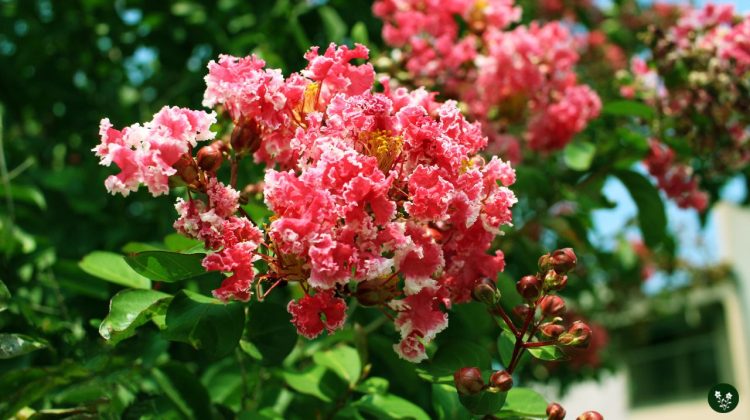
The Myrtle Flower is a beautiful bloom with a rich history of meaning and symbolism across various cultures.
In the language of flowers, Myrtle represents purity, hope, and rebirth, making it a fitting symbol for devotional and romantic meanings that have persisted since Ancient Greece.
Going back in time, the Myrtle Flower has always been considered a symbol of love. The Greek goddess Aphrodite and Roman deity Venus, both associated with love, were often depicted with this flower.
In Greece, it is believed that planting myrtle flowers throughout the country invites positive energy.
Not only does the Myrtle Flower symbolize love, but it is also associated with good luck in marriage, chastity, marital fidelity, and prosperity.
The common name ‘myrtle’ is derived from the ancient Greek word ‘myrtos’, meaning a sprig of the myrtle tree, highlighting its connection to Greek mythology and culture.
In this article, we'll cover
1. History of Myrtle Flowers
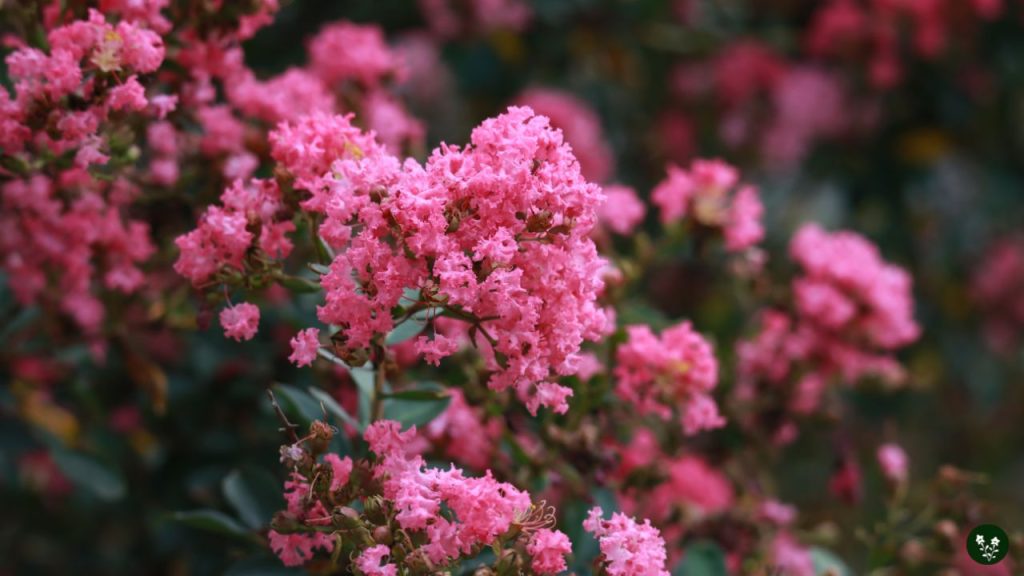
The origins of myrtle flower symbolism can be traced back to ancient Greece, where it was considered sacred to Aphrodite, the goddess of love.
This association gave the myrtle flower a potent layer of love symbolism. In addition, garlands of myrtle foliage and blooms were also sacred to Demeter, the goddess of agriculture and fertility.
In later periods, Myrtle came to represent different ideas in different cultures.
For instance, in Christianity, Myrtle lost its Greco-Roman association with female sexuality and instead became an emblematic symbol of purity, symbolizing the Virgin Mary.
This symbolism refers to the community and notions of peace, Eden, and marriage.
Myrtle flowers have adopted various meanings based on their cultural context. Some common associations include love, joy, beauty, new beginnings, purity, and innocence.
Similarly, myrtle flowers are symbols of marital fidelity, good luck, and prosperity in love.
They have been dedicated to lovers to represent mutual respect and commitment toward each other, making them a symbol of everlasting love.
2. Myrtle Flowers Symbolism and Meanings
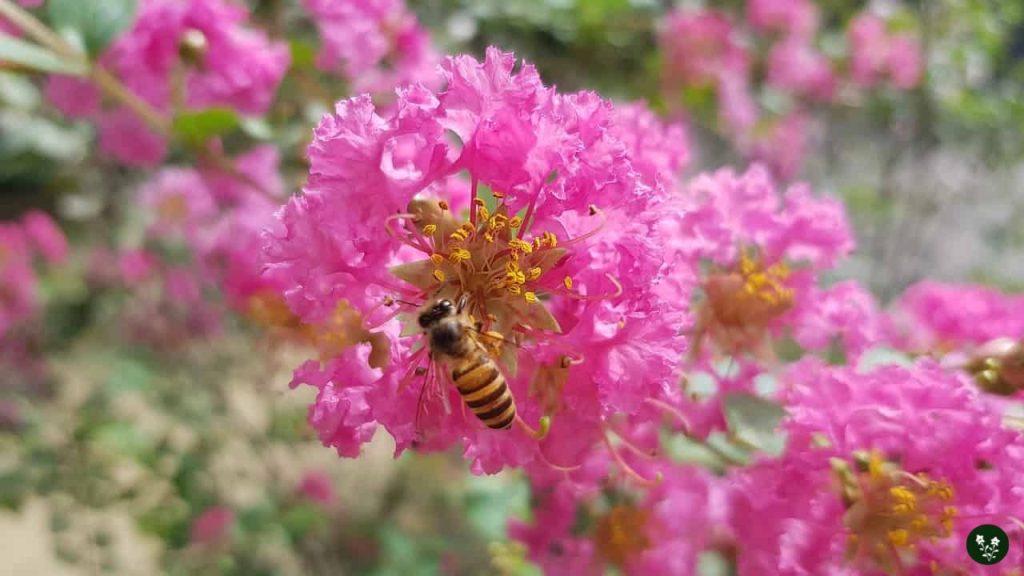
Love and Marriage
Myrtle flowers carry a rich symbolism of love and affection, making them popular for weddings and other romantic ceremonies.
The connection between Myrtle and love dates back to ancient Greek mythology, where Venus, the goddess of love, hid behind a myrtle tree when ashamed of her nudity.
Given their association with Venus, these flowers also symbolize fertility.
Protection and Good Luck
Myrtle has long been considered a symbol of wealth and prosperity. Bringing myrtle flowers into the home promotes positive energy and good luck.
Additionally, the flower is frequently used in various religious ceremonies and rituals due to its protective properties.
Purity and Innocence
White myrtle flowers, in particular, symbolize purity and innocence. Myrtle represents hope and rebirth in the language of flowers due to its typical color profile.
Myrtle flowers are often incorporated into wedding celebrations and ceremonies as a symbol of a bride’s purity and innocence.
3. Myrtle Flowers Cultural Significance
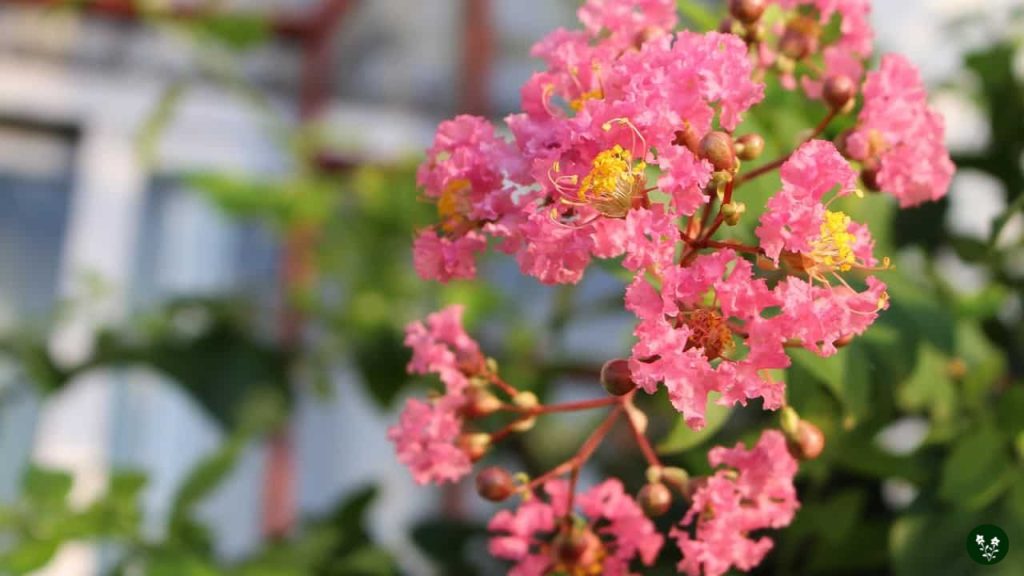
Ancient Greece and Rome
Myrtle flowers have a deep-rooted cultural significance in Ancient Greece and Rome.
They were often associated with the Greek goddess of love, Aphrodite, and the Roman goddess Venus, symbolizing love, affection, and beauty.
In addition, Myrtle, with its color profile, held symbolic meanings of purity, hope, and rebirth. Its devotional and romantic meanings have persisted since ancient times.
Jewish Tradition
Myrtle holds a unique place in Jewish tradition as it represents community, peace, and marriage.
It is an emblem of tranquility and harmony within the community, making it an essential element in various Jewish ceremonies.
Victorian Era
During the Victorian Era, the language of flowers flourished, and Myrtle continued to symbolize love, innocence, and purity. It was often used in wedding ceremonies to represent the bride’s purity and devotion.
Furthermore, Myrtle symbolized fertility due to its association with Venus, the goddess of love and fertility. This made it a popular choice for wedding bouquets and floral arrangements.
4. Gifting Myrtle Flowers
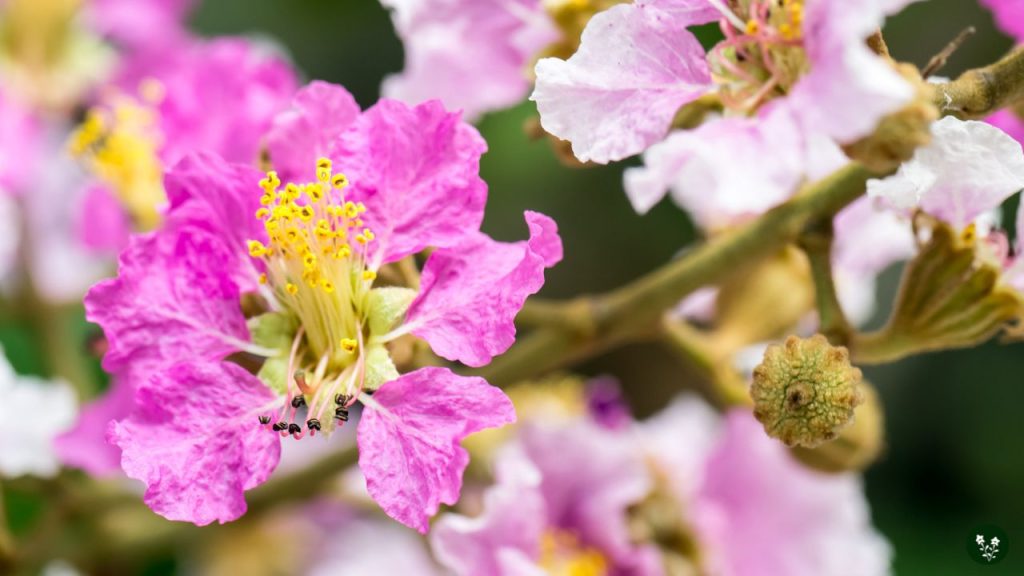
Myrtle flowers carry a deep symbolism of love, devotion, and purity, making them suitable gifts for various occasions.
Weddings and Anniversaries
As a symbol of love and fertility, myrtle flowers are an ideal choice for wedding-related events. They are often incorporated into bridal bouquets and other floral arrangements to represent purity and innocence.
Their association with Venus, the goddess of love and fertility, further cements their significance in marriage ceremonies.
In Europe, myrtle flowers play a prominent role in wedding bouquets, symbolizing romance, devotion, and love.
Housewarmings
Myrtle flowers are not only limited to romantic occasions. Gifting a potted myrtle plant or a beautifully arranged myrtle bouquet can be a thoughtful gesture for housewarming parties.
Their association with purification and rebirth in modern spiritual movements makes them an appropriate gift for welcoming someone into their new home and wishing them a fresh start.
Other Occasions
Myrtle flowers can also be gifted on other occasions, such as birthdays or celebrating a significant life milestone.
Their symbolism of love and affection may resonate with the recipient, and their attractive colors can bring joy and liveliness to any celebration.
Moreover, their fragrance is frequently used in perfumes, making them an appealing choice for those with an affinity for pleasant scents.
Explore the beauty and symbolism of flowers:
learned a few trivial things with Myrtle ( Lore, Landscaping )